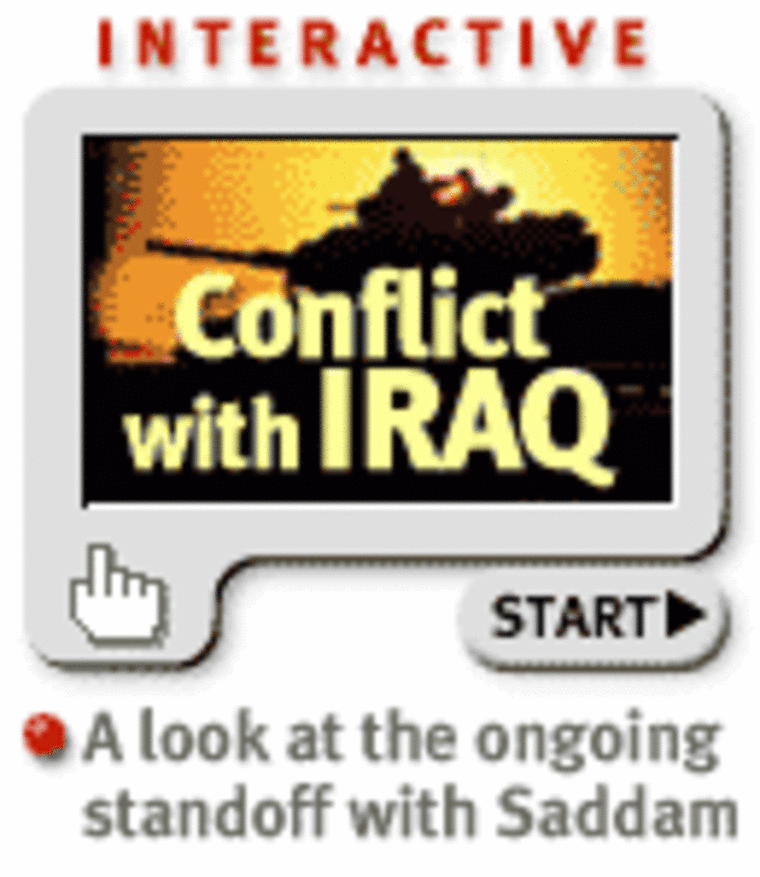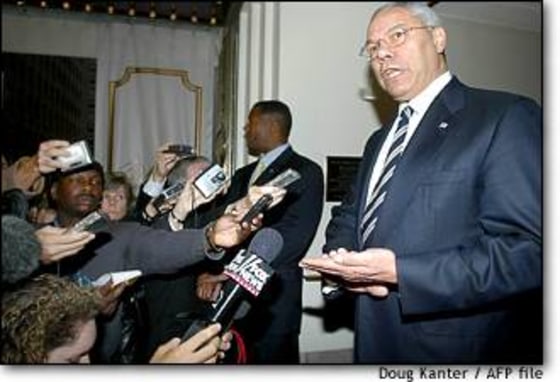The hue and cry over Saddam Hussein and his arsenal is building to a crescendo right now, as the United Nations debate nears an end. President George W. Bush reminded the world this week, as if it needed reminding, that America intends to act against Iraq regardless of what the U.N.’s great powers decide. While that certainly will concentrate the minds of Security Council diplomats, it masks an important fact: behind the tough talk is an administration less gung ho about an Iraq war right now than at any time since the attacks of Sept. 11, 2001.
LITTLE MORE than a month ago, before it dawned on the Bush administration that it would be disastrous to launch a war against Iraq without even attempting to make the case for action to the world through the United Nations, the United States had plans for an attack that, by this late date, would be just a few short weeks away. Late November or early December, depending on which insistently anonymous senior military official spoke with you, would contain a “D-Day.” Carrier battle groups were being diverted, American military commands were being moved into the Persian Gulf, military leaves were cancelled and refueling and airspace agreements with U.S. allies were confirmed and reconfirmed.

It was during that last process — the mundane but crucial job of securing operational bases and air corridors for American aircraft and troops — that the depth of the world’s opposition to a preemptive war became clear to the Bush administration. This opposition extended well beyond the usual suspects, China, Russia and Bush’s so-called ‘axis of evil.’ Germany, Turkey, India, France, Canada and Egypt objected. Israel, normally happy to see America targeting one of its rivals, fretted that a desperate Iraq might lash out with weapons of mass destruction. And not only did America’s Arab allies oppose such a war publicly, they also opposed the idea privately. At the center of most of these objections: America’s unwillingness to subject its plans, along with the motives behind them, to the scrutiny of the U.N. Security Council.
UNWELCOME MESSAGE
Secretary of State Colin Powell, set up as the foil for the administration’s unilateralist foreign policy moves, had been warning about the danger of going forward without some U.N. consultation since the very day after Sept. 11 attacks. According to a State Department official familiar with the debate within the administration, Powell also consistently warned that moving against Saddam without first building support at least among nations normally considered America’s allies would, in the long run, strengthen al-Qaida.
“This wasn’t just the usual argument you hear in Europe — that bin Laden wins recruits if we act arrogantly,” the State Department official said. “These were specific indications from American allies that said they couldn’t guarantee that cooperation against al-Qaida within their borders could continue at the same level if America insisted on disregarding their views entirely.”
Like most purveyors of bad news, Powell reaped the whirlwind, particularly in the right-wing media, where less honorable men have compared his insistence on not rushing to war everytime there is a problem in the world with Neville Chamberlain’s appeasement of Hitler in 1938. Still, by September, Powell’s view won the day, and his victory within the administration manifested itself in the president’s speech to the United Nations to the United Nations last month.
“That speech was a turning point,” a European diplomat at the United Nations says. “No, we don’t all agree on what to do. But at least we all agree that there should be a discussion. That was a huge, smart move.”
Further, by placing the onus on the United Nations, Bush successfully framed the debate in the Security Council as “what are we going to do about Iraq,” rather than, “should we do something about Iraq.”
PROMETHEUS BOUND
Since then, the “game,” if one can use such a light term for so weighty a subject, has changed significantly. With few illusions about the ultimate goal of the United States — a war that will remove Saddam from power — the baldest kind of horse-trading ensued. There are subtleties that invariably get left out of short accounts like this, and I’ll even admit to some cynicism with regard to the discussions underway in the Security Council. Surely, France, Britain, the U.S., Russia and China have moral reasons for the positions they take, too. But, based on discussions with diplomats and the interests of individual member states, here’s my best estimation of what each permanent member appears to be trying to achieve from a new Iraq resolution.
CHINA: As soon as the United States agreed to allow the issue to be part of the Security Council’s discussions, China’s concerns, by and large, were addressed. China has no great love for Saddam, but does prefer that Persian Gulf oil, on which it is increasingly dependent, not to be interrupted. But these concerns were outweighed by the opportunity this debate afforded China to a.) act as a great power and b) do the United States the enormous favor of abstaining, rather than vetoing, an Iraq resolution.
RUSSIA: Owed $8 billion by Saddam’s regime and with oil contracts worth far more at stake should his regime fall, the issue is a tricky one for Russia. By now, Washington’s diplomats will have assured Russia that diplomatic support now will protect their economic interests in Iraq later. So, with Moscow and Washington increasingly in sync in the larger “war on terrorism,” why is Moscow still playing hardball?
Dr. F. J. Chalabi, an oil industry consultant and a former deputy oil minister who fled Iraq in the 1970s, told me that oil doesn’t explain everything: “Russia and France would like to give more power to the United Nations, which means more power to them,” he says. He is a close relation, by the way, to Ahmed Chalabi, head of the U.S.-backed opposition to Saddam, the Iraqi National Congress. Russia will, ultimately, support a war if it gets a chance to have its say.
FRANCE: Like Russia, France has contracts pending worth tens of billions of dollars to exploit Iraqi oil fields if U.N. sanctions ever are lifted. Unlike Russia, the French contracts never were ratified by the Iraqis - a clever way to blackmail Paris at key moments over the past few years. (It worked, by the way). Even more than the Russians, the French need the United Nations as a means to exert influence, since its diminishing military power and retreat from its post-colonial position in Africa have left it just another mid-sized power. If the Security Council had been created last week instead of in 1945, the French probably would not have a permanent seat. They know it and look to exploit their good fortune at every turn. In the end, though, their interest lies in influencing the debate on war, but not in taking a Quixotic stand against one.
BRITAIN: There were two ways, following the collapse of the Berlin Wall, for a mid-sized European power to retain its influence on the wider world even as America’s attention strayed and the European Union threatened to swamp national identities. France chose the first course: international gadfly. Britain chose the other: cozying up to the superpower.
Tony Blair fervently believes that his nation’s interests (and his historical legacy) lie in cultivating the trans-Atlantic relationship first kindled by Churchill and Roosevelt. Polls in Britain consistently show the public there deeply divided on the question of war, though the numbers improve significantly if the U.N. Security Council agrees. But Blair’s hold on his party is powerful, and any but full support at this point would be read by Bush as a betrayal.
TIMING IS EVERYTHING
What does all this have to do with Saddam Hussein? Well, very little, and that is the point. The U.N. debate has been frustrating to many Americans, particularly for those on the right who criticize the United Nations’ policies and processes.
The inconvenient U.N. debate forced the administration to shelve plans for a war it hopes will be a short one. The U.N. process ensures that, when inspectors return to Iraq, even if they find Iraq obstructing them almost immediately, it will take at least three months before approval for a war could be obtained, and another two months for the United States and its allies to build up a critical mass of power in the region. And many military analysts suggest that fighting in the desert heart during the Iraqi summer is something the United States will seek to avoid at all costs.
War, as the president rightly pointed out recently, is not imminent — even if it is inevitable.
Yet Powell’s warnings of over a year ago look ever more prescient now in the wake of al-Qaida’s chilling autumn revival. Even if you withhold judgment on the horrible Chechen attack last weekend in Moscow, it certainly is true that, at the very least, local groups sympathetic to al-Qaida’s aims have mounted bloody attacks in Bali, Afghanistan, Kuwait, the Philippines, on a tanker in the Gulf of Oman and an American diplomat in Jordan.
Add the nuclear crisis in North Korea, and you can understand why the world, along with a good chunk of the American electorate, may not view Saddam Hussein as public enemy No. 1. or even the top item on the American agenda.
With all that in play, is it really surprising that the Bush administration, which climbed so far out on the limb of unilateral, preemptive action against Iraq, has quietly begun to climb back?
Michael Moran, senior producer for special reports, writes a weekly column on foreign affairs.
